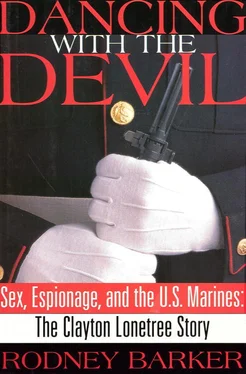But she hadn’t. He described their conversations as “pure innocent talk.” Besides, there was nothing really to report.
Still, he was thinking that maybe it would be best for him to cool things when, the next day, Violetta approached him and said they needed to talk. Her manner was cautious and she seemed worried. When they met later, he learned that she was having some of the same concerns.
“You have to understand my position,” she said.
“Tell me,” he replied.
She looked away. “I can’t tell you.”
He implored her. “You can tell me a little bit about it. I won’t say anything.”
He was serious. His own security was at risk here too.
Her response was deliberately vague, but he interpreted it to mean that she didn’t trust the other FSNs working at the embassy not to report on her activities with him if they found out. And she also was unsure about who he really was. Maybe he was just posing as a Marine guard and actually was CIA.
Her apprehension meant a lot to him. It meant if they continued, she would be discreet. And it meant she too cared and was willing to take risks to be with him.
They decided not to break it off but to “keep it low-key.”
Over the next few weeks they carried on a clandestine relationship that consisted of meaningful glances and casual pleasantries, and the complicty involved in the game of limiting their exchanges and keeping their friendship a secret actually had a strengthening effect. That fall he was selected for temporary guard duty at the summit meeting in Geneva, and when he wasn’t keeping an eye out for terrorists, he went shopping for Violetta, buying her Western fashion magazines, including Glamour.
Then came the Marine Corps Ball on November 9, 1985, at the ambassador’s residence back in Moscow. It was the social event of the year, and among the guests cleared for invitations were most of the FSNs who worked at the embassy. Marines were not allowed to escort dates, but they did form a reception line to greet the guests, and it was their job to take the arm of each woman attending the ball and walk her onto the dance floor. Lonetree and Violetta danced once together that evening, and with exaggerated formality she shook his hand and offered “birthday congratulations,” because she knew his birthday had fallen on November 6. He made an effort to be cautious, fearing they might be under observation by the other guests, and was relieved to see many of the diplomats in attendance also dancing with Russian employees.
When he and Violetta had a private moment alone, he encouraged her to attend other MSG functions where FSNs were permitted so they could spend more time together. And it was shortly after that that Violetta attended a farewell party at the Marine House at the invitation of another Marine guard. This gave them the time together they both seemed to want. They had an extensive conversation, they danced together, holding each other a beat longer than the music, and they touched hands when they thought no one was looking. He found her electrically attractive. When he was around her, he felt a current between them that instantly transferred energy, lighting him up. And after this evening he believed the attraction was mutual.
Several days later he made his first solo trip to her apartment. She introduced him to her mother and younger sister, who were watching a color television, and they retired to her bedroom, where they talked and later viewed a family photograph album. On this occasion Violetta gave him a black-and-white photograph of herself, and he gave her a picture of himself standing in Red Square. When he showed her photos of Geneva, it initiated a conversation about travel. She said her dream was to visit Paris, but she spoke about it wistfully, as though she knew it would never happen. This led to her admission that she disliked the way her government was so restrictive, limiting the freedom of movement of its citizens and preventing them from visiting other countries.
Although he had come alone and taken measures to avoid KGB surveillance—changing coats and trains—Lonetree allowed her to walk him back to the metro, where she kissed him publicly for the first time.
November was almost over when Violetta broke the news that she was going to quit her job at the embassy. She said she could no longer stand to work around a particular Soviet employee, who treated her as though she were his mistress. And she said she had been offered a job at the Irish Embassy.
Her departure changed nothing. Their relationship proceeded as before, only now it took a decidedly romantic turn.
Routinely he would log out of the embassy, indicating he was going to the West German Embassy or for a jog when in fact he was leaving to meet Violetta. Sometimes they would stroll through Gorky Park hand in hand, stealing kisses behind trees. As they walked he would try his Russian out on her, and when she laughed at his pronunciation and corrected him, he would pretend to pout and refuse to say anything more—which forced her to have to make up to him.
But they were afraid to go to many places in public together; she because of the KGB, and he because his Marine career was over if the wrong person saw him. They tried to hide in the crowds, but they were always nervous and often they ended up going back to her apartment and listening to her collection of records. She liked Michael Jackson, but he didn’t. “I tried to tell her the guy was a homo. I said, Don’t listen to him. But she didn’t listen to me.”
Once, while watching the news on TV, they saw an American aircraft carrier steaming into some world hot spot, and he commented, “Now, that’s beautiful,” meaning the ship. But she challenged him, accusing America of meddling in the affairs of other countries, and it resulted in their first argument.
Another disagreement they had was over whether the United States and Russia had been allies against the Germans in World War II. She didn’t believe it, which appalled him almost as much as when she vehemently denied the existence of God. He asked her what made her so sure and she said, “Just take my word for it.”
“It’s gonna take more than that,” he told her.
More often they would hold and caress each other, and it was in the privacy of her bedroom that they first made love. It was not a physically passionate act. It was more a tender, intimate union, hurried in case her mother came home and hushed out of concern the neighbors on the other side of the thin walls would hear what was going on. As he would describe the scene, “It was good for me. Better than for her, I think. She said, ‘I just want to be close to you. That’s better than the sex.’ ”
Afterward they had another argument. As he thought about what had just happened and how it had compromised him even further, he kidded her. “You are KGB, aren’t you?”
It was an old tease, his accusing her of being a KGB agent, her responding with the accusation that she was just as much KGB as he was CIA. But the timing was off, and she ordered him out of the flat. Mumbling as he put on his clothes, he called her “a stupid broad,” and she was so insulted she slapped him.
All the way back to the embassy he asked himself what he was getting himself into and vowed to break it off right there. But he returned to her flat the next day, and her first remark was she had expected him sooner.
As close as Lonetree was getting to Violetta, he was also becoming increasingly absorbed into her family. Now when he visited her home, her mother, who had been initially leery of him, welcomed him warmly. “You’re too thin,” she would say, and insist that he join them at the dinner table. Few Marines could ever say they had eaten a meal in the home of a Russian citizen, but now he could. Once, her father visited while he was there and they drank vodka together. Completing the impression that he was with a second family, Violetta’s little sister, Svetlana, would crawl onto his lap with a picture book and want him to tell her the English names for things. Already she knew a little English, and this impressed him because he knew there were not many ten-year-olds in America eager to learn Russian.
Читать дальше












